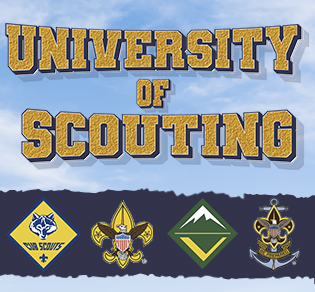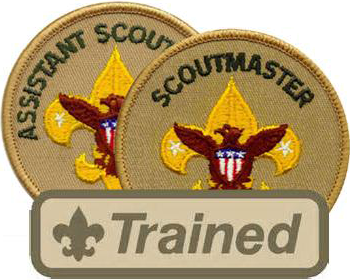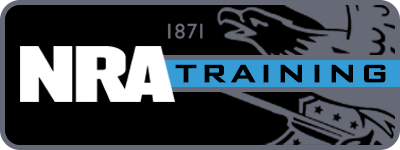






May 1-3, 2026 - Outdoor Adventures
University of Scouting is a semi-annual supplemental training program. Sessions are led by experienced volunteers who will help leaders and parents enhance their ability to deliver a fun and exciting program to the Scouts. The spring event will focus on outdoor trainings.
Registration
There is no onsite registration. At checkout, pay with a credit card or electronic check. Council refund policy.






 What to Bring
What to Bring
About Introduction To Outdoor Leader Skills (IOLS)







 Introduction to Outdoor Leader Skills (IOLS) is a 16-hour overnight course that gives adult leaders the practical knowledge they need to help Scouts to learn outdoor skills. The skills presented closely follow the Scout Handbook and rank advancement requirements. This is a required training course for all Scoutmasters and assistant Scoutmasters. Working as patrols, this hands-on course provides adult leaders with the practical outdoor skills they need to lead Scouts in the outdoors. Upon completion, leaders should feel comfortable teaching Scouts the basic skills required to obtain the First Class rank. Topics covered: • Campsite Selection • Ropes – Whipping, Tying, and Lashing • Wood Tools – Knife, Camp Saw, and Ax • Fire Site Preparation and Building • Cooking • First Aid • Plant and Animal Identification • Packing and Hiking Techniques • Map and Compass • Leave No Trace. The training encompasses a weekend (16 hours of instruction).
Introduction to Outdoor Leader Skills (IOLS) is a 16-hour overnight course that gives adult leaders the practical knowledge they need to help Scouts to learn outdoor skills. The skills presented closely follow the Scout Handbook and rank advancement requirements. This is a required training course for all Scoutmasters and assistant Scoutmasters. Working as patrols, this hands-on course provides adult leaders with the practical outdoor skills they need to lead Scouts in the outdoors. Upon completion, leaders should feel comfortable teaching Scouts the basic skills required to obtain the First Class rank. Topics covered: • Campsite Selection • Ropes – Whipping, Tying, and Lashing • Wood Tools – Knife, Camp Saw, and Ax • Fire Site Preparation and Building • Cooking • First Aid • Plant and Animal Identification • Packing and Hiking Techniques • Map and Compass • Leave No Trace. The training encompasses a weekend (16 hours of instruction).
What to Bring: In addition to the list above, bring the following: Clothes: field uniform, activity uniform (Scout t-shirt) or comfortable clothes, closed-toe shoes (boots or tennis shoes), jacket, rain gear. Scouting ten essentials: pocket knife, first aid kit, extra clothes, rain gear, refillable water bottle, flashlight or headlamp with extra batteries, trail food, matches and fire starters, sun protection, map and compass. Personal Gear: tent, ground cloth, camp chair, sleeping bag or blanket, sleeping pad or cot, mess kit (knife, fork, spoon, bowl/plate, coffee cup in a mesh bag), bug repellent, sunscreen, personal hygiene products (e.g., toothpaste, deodorant), note-taking materials, 3-ring binder, backpack, personal medications. Recommended: Field Book, Troop Leader Guidebook, Scout Handbook. Optional gear: sunglasses, camera, earplugs, gloves for saw and ax demonstration. The course fee includes four meals (3 on Saturday and Sunday breakfast). Eat breakfast before arriving.
About Trainer's EDGE (all-day training for youth and adult training)
About Range Master Training
About Range and Target Activities Training







 NRA instructor trainings are designed to develop NRA-certified instructors who possess the knowledge, skills, and attitude necessary to safely teach the NRA basic firearm training courses. Through the NRA training, adults who already have subject matter expertise, learn how to conduct a firearms class the NRA way so the candidates earn the NRA Instructor certification. Learn more about becoming an NRA instructor.
NRA instructor trainings are designed to develop NRA-certified instructors who possess the knowledge, skills, and attitude necessary to safely teach the NRA basic firearm training courses. Through the NRA training, adults who already have subject matter expertise, learn how to conduct a firearms class the NRA way so the candidates earn the NRA Instructor certification. Learn more about becoming an NRA instructor.
What to bring: In addition to the list above, if a cabin was reserved, bring sheets for a twin bed and a pillow. If camping, bring a tent and camping gear.
NRA Range Safety Officer (RSO) Training: Learn how to supervise, monitor, and enforce safety regulations during range and target activities. RSOs oversee range operations, conduct safety briefings, handle malfunctions, and have the authority to halt firing to prevent accidents, acting as the guardian of safety on the range • One RSO is required at each range.
Prerequisites: None. 9 hours of instruction. Certification allows: • Run a shooting range at a troop, crew, ship, district or council event. • Upon course completion, NRA certification is required and incurs an additional fee. Detailed instructions will be provided.
What to bring: In addition to the list above, if a cabin was reserved
, bring sheets for a twin bed and a pillow. If camping, bring a tent and camping gear.







About COPE Facilitator Training
COPE (Challenging Outdoor Personal Experience) is an exciting program that teaches important lessons, but the classroom is like no other. COPE uses mental and physical challenges, low and high above ground to teach confidence, self-esteem, trust, leadership, team building and problem-solving. As a COPE facilitator, you'll help participants climb, swing, balance, jump, and think of solutions to a variety of activities.
COPE Level 1 training covers the skills and information needed to staff any BSA climbing program and provides an introduction to COPE, instilling the goals of COPE, NCAP Standards, how to sequence and process a group, trust activities, zip line, Low COPE and an introduction to High COPE. Topics covered: goals and features of COPE, sequencing and processing, stories and tall tales, trust activities, low course activities, high course activities. COPE Level 1 certificate holders can staff council COPE programs, council climbing towers, council climbing walls, and council bouldering walls with a Level 2 or climbing director present. Prerequisites: • Climb on Safely taken online • age 18+ • COPE and climbing experience recommended
What to bring: In addition to the list above, if a cabin was reserved, bring sheets for a twin bed and a pillow. If camping, bring a tent and camping gear.
About Climbing Training
During Climbing Level 1 Training, participants learn to teach Scouts how to climb and rappel at the unit, district, or council level. The training covers the skills and information needed to staff any BSA Climbing Program. Topics covered: site selection and management, environmental conditions, rock climbing and technique, anchoring, bouldering, teaching Climb On Safely, and teaching the Climbing Merit Badge. Climbing Level 1 certificate holders are allowed to supervise real rock programs, council climbing towers, council climbing walls, and council bouldering walls with a Level 2 or climbing director present and to teach the Climbing Merit Badge.
Prerequisites: • Climb on Safely taken online • age 18+ • climbing experience recommended
Climbing Level 1 certificate holders are allowed to supervise real rock programs, council climbing towers, council climbing walls, and council bouldering walls with a Level 2 or climbing director present and teach the Climbing Merit Badge.
What to bring: In addition to the list above, if a cabin was reserved, bring sheets for a twin bed and a pillow. If camping, bring a tent and camping gear.
-------------------------------------------------------------------------------------------------------------------------------------------------------------------------------------------------------------------------------------------------------------------------------------------------------------
Climbing Level 2 Training - Artificial Surface tests current climbing and repelling knowledge and skills, covers the skills and information needed to supervise climbing activities at permissible locations, expands Level 1 knowledge using troop or personal equipment and gear brought by the participant. The training expands on existing knowledge and focuses on event and site management and incident resolution so that an Instructor may lead a unit properly and with confidence, utilizing artificial structures. Topics covered: site selection and management, rock climbing and repelling technique, anchoring, standards recap, and proper structure operations. Climbing Level 2 certificate holders can supervise climbing and rappelling activities with at least one additional climbing instructor to assist the lead instructor to maintain a 6:1 youth to adult ratio and teach the Climbing Merit Badge.
Prerequisites: • Climb on Safely taken online at my.scouting.org • Climbing Level 1 Training • Competence in basic climbing skills as found in Climbing Merit Badge requirements #5, 7-11. • Age 21+
What to bring: In addition to the list above, if a cabin was reserved, bring sheets for a twin bed and a pillow. If camping, bring a tent and camping gear
Contacts